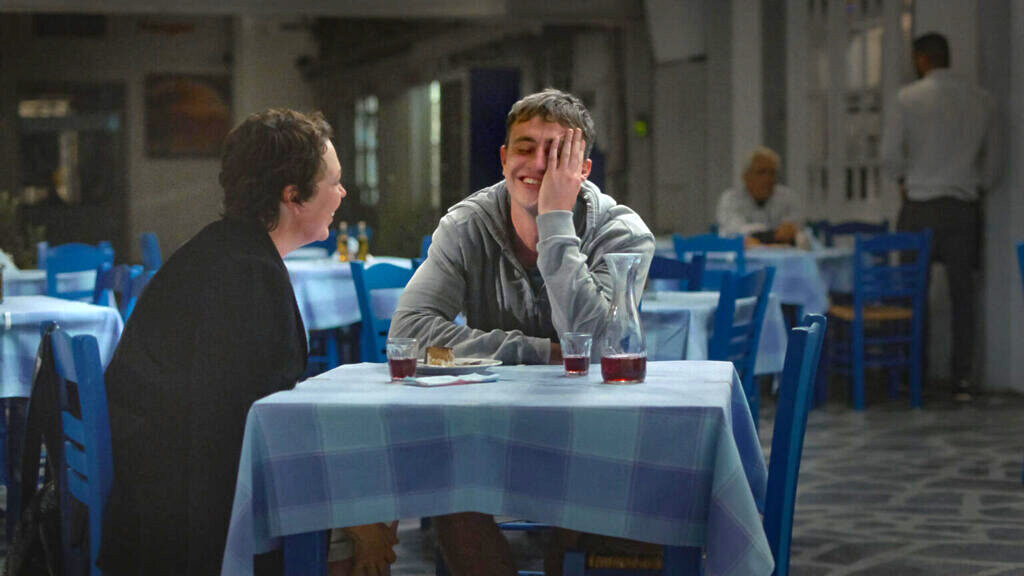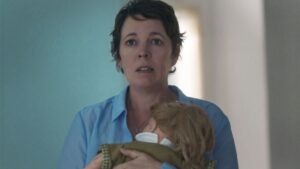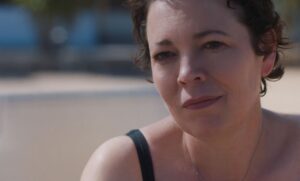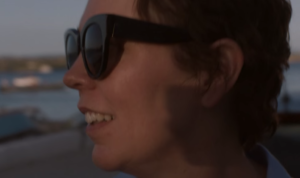Written and Directed by Maggie Gyllenhaal, based on the novel by Elena Ferrante | 121 min | Netflix | ▲▲▲▲△
About 20 minutes into Maggie Gyllenhaal’s debut as a feature filmmaker I was starting to wonder when the film would start.
The film feels like an almost plotless travelogue about an academic, Leda (Olivia Colman) visiting a Greek resort for some alone time. She meets the caretaker, Lyle (Ed Harris), who sets her up in an apartment, and she meets Will (Paul Mescal), the guy who serves ice-cream and drinks to visitors on the beach.
Everything’s great until an oddly threatening Greek-American family appears on said beach, ruining Leda’s idyll. They’re loud and coarse and disruptive. But the story I was waiting for really starts — with a crackle — when Leda speaks with one of the family, Callie (Dagmara Dominczyk), about Callie’s forthcoming child. The themes of the tale begin to manifest with Leda’s apparent discomfort.
When another of the family’s young mothers, Nina (Dakota Johnson), loses her daughter on the beach, Leda finds the little girl. That makes a connection between the women. Just then The Lost Daughter offers up a second narrative, in the past, where Leda (Jessie Buckley) struggles to be a mother to her two daughters while working on her dissertation.
It turns out there’s plenty of plot and tension here — as we learn more about the decisions Leda made in the past, it informs how we understand her behaviour in the present — this as she finds common ground with Nina and her struggles to be a mother and wife. Then there’s the fate of a special doll.
The themes of this complex and incisive psychological drama bubble repeatedly to the surface: Mostly about the challenges of motherhood for women who feel overwhelmed by it. The sacrifices women are expected to make in that role, and what happens when they decide they want more of a life for themselves, separate from the crushing daily responsibilities of taking care of children. Is this the final taboo of parenthood, the idea that some women simply wish they’d never given birth? The story walks fearlessly across those cultural hot coals.
It doesn’t all work so flawlessly, though. A scene early on in a kids’ store feels expository and implausible, and we get a few of plot developments in the final few minutes where the imagery gets more jagged and suggestive, but the film ends up leaving more questions than satisfying answers.
Still, there’s no surprise a gifted performer like Gyllenhaal would have a knack for coaxing the same from her cast, which helps keep us gripped throughout.
Olivia Colman is the queen of wonderfully awkward moments, like when she thinks she sees someone on the beach she knows, and calls out, but it isn’t them. Or when she sidles up behind Lyle in the bar, whispering in his ear before running out. Or when she sings along to The Talking Heads’ “People Like Us” in the car, or Bon Jovi’s “Livin’ On A Prayer” at a dance party. The film is stuffed with these beautifully spontaneous-feeling moments, unlikely but joyous physicality that lifts what’s an otherwise solemn, sometimes slippery character study — it’s a masterclass from Colman. I hope she’s recognized come awards time.
And in support she finds terrific partners in Johnson, who shows a maturity in her work I’ve not seen before from her, and Buckley, who’s entirely believable as the younger version of Colman’s character. Gyllenhaal’s husband in real life, the always engaging Peter Sarsgaard, brings a great beard to bear and makes an impression in just a few scenes.
What’s most exciting here is how capable Gyllenhaal is with genuinely difficult material. Even with a couple of missteps, the way she navigates this adaptation suggests a master finding her voice.
One last note: In the first five minutes of the film, as Leda is arriving in Greece, we get a lot of extreme close-ups, including a golden-hour shot where the shadow of the camera plainly crosses Colman’s face. Given the precision with which Gyllenhaal tells her story with legendary DP Hélène Louvart, I can’t believe this was a mistake. I wonder why they made that choice. Would be interested in hearing any theories out there.












